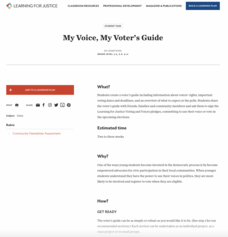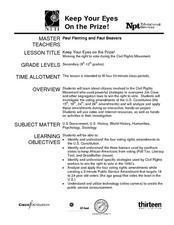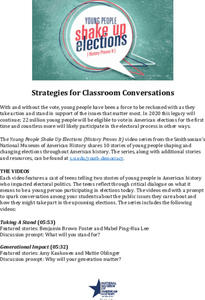National Woman's History Museum
State vs. Federal Campaigns
Campaigns to gain voting rights for women during the 19th and 20th centuries took place on both the state and federal level. After examining primary sources that document both types of campaigns, class members debate the merits of the...
US National Archives
Susan B. Anthony and the Struggle for Suffrage
Susan B. Anthony was willing to break the law to gain voting rights for women. Young historians investigate Anthony's willingness to go to jail to draw attention to the suffrage movement. They read and discuss primary source documents to...
National Woman's History Museum
Propaganda and Women's Suffrage
Americans who backed the suffragist movement used posters to gain the support of others for their cause. Class members analyze the visual imagery and propaganda devices used in a variety of these posters. In addition, groups examine how...
Newseum
You Can’t Say That: Right to Know vs. Security Risk
Print or block? That is the question young journalists debate as part of their study of the freedom of the press. Half the class represents the journalists' legal team, and the other half represents the government's legal team. Teams...
Curated OER
Fight For Your Right - Leading A Revolution of Change
Students examine civil rights. In this civil rights lesson, students research human rights issues of United States history. Students then discuss their research findings and write Bill of Rights statements for the topics they researched.
Teaching Tolerance
My Voice, My Voter's Guide
Class members may be too young to vote, but that doesn't mean their voices are silent! After researching key information, such as policies for registering to what to expect at the polls, young scholars create and present election guides...
Bill of Rights Institute
Freedom for All?
What did abolitionists have in common with those working for women's rights? How has the Native American struggle for voting rights differed from the struggles of other groups? Class members examine the 15th, 19th, 23rd, 24th, and 26th...
EngageNY
Main Ideas in Informational Text: Analyzing a Firsthand Human Rights Account for Connections to Specific Articles of the UDHR
Lesson 10 in a series of human rights lessons focuses on the skills of finding evidence and summarizing. Your young readers work to compare the two texts they have read in this unit: the Universal Declaration of Human Rights...
Civil Rights Movement Veterans
Timeline of Events: 1960’s Civil Rights Movement of St. Augustine, Florida
A timeline can be a powerful learning tool because it reveals a pattern in events. While few would consider St. Augustine, Florida a hotbed of the 1960s Civil Rights Movement, a selection of background information and a timeline of...
Stanford University
Civil Rights Act of 1964
Was JFK a fallen Civil Rights hero—or a fraud? Learners examine Kennedy's own words and those of his critics to decide for themselves. After examining Kennedy's actions before his assassination, they determine what sort of legacy he left...
EngageNY
Main Ideas in Informational Text: Analyzing a Firsthand Human Rights Account
Although this is part of a series, lesson plan nine has your class take a break from their close study of the Universal Declaration of Human Rights (UDHR) text to read the firsthand account “Teaching Nepalis to Read, Plant, and Vote” by...
Curated OER
Cartoons for the Classroom: Celebrating the 19th Amendment
Eighty-eight years after women earned the right to vote, a women ran for president. Young analysts consider the role women play in politics, how they are portrayed, the standards they are held to, and if they are still treated unfairly...
Mrs. Hodges' Social Studies Classes
I Have Rights?!
Do young people have rights in the United States? Your pupils will not only learn the answer to this important question, but will also build vocabulary through cloze activities and gain a thorough introduction to the Bill of Rights.
Curated OER
Keep Your Eye On the Prize
High schoolers learn about citizens who were actively involved in the civil rights movement, and the strategies they used to overcome the Jim Crow laws that were so prevalent in the 1960s. They investigate the voting amendments of the US...
Carolina K-12
Preventing Voter Fraud or Encouraging Voter Suppression?
The issues of voter fraud and voter suppression are relevant in every election, local as well as national. Soon-to-be voters learn about a recent bill proposed in North Carolina, the Voter Information and Verification Act, and decide for...
Curated OER
Picturing Freedom: Selma-to-Montgomery March, 1965
Students analyze primary sources to investigate the Civil Rights Movement. In this Civil Rights lesson plan, students explore the passage of Voting Rights Act of 1965 and how photojournalism impacted the passage of the legislation....
Curated OER
Bang to Rights
Students take a closer look at the rights of British prisoners. In this current events lesson, students research the listed Web sites that include information about the British justice system and voting practices. Students discuss...
Curated OER
To Vote or Not to Vote? that is the Question!
Learners examine voting rights provided by the United States Constitution. In this voting lesson, students focus on 3 amendments that extended voting rights to all citizens. Learners discuss the importance of expressing opinions through...
Curated OER
Suffrage Strategies: Voices for Votes
Students discuss the history and importance of voting. In this voting lesson, students research the women's suffrage movement and the methods used to change people's beliefs about suffrage for women. Students also create posters to...
Curated OER
The March from Selma to Montgomery
Students examine voter discrimination. In this Civil Rights lesson, students watch segments of "Eyes on the Prize" and discuss the organization of the march from Selma to Montgomery. Students conduct interviews to learn personal stories...
Curated OER
Religion and the Civil Rights Movement
Young scholars investigate the role of religion in the Civil Rights Movement. In this religion and ethics lesson, students explore the separation of church and state as they examine how religious faith has inspired social change in the...
Smithsonian Institution
Young People Shake Up Elections (History Proves It) Educator Guide
Vote, it's your civic duty! The resource provides several videos about voting in the United States. Scholars watch a series of topics ranging from youth participation to civic action. The educator's guide provides teachers with...
College Board
Civic Knowledge and Action in AP U.S. Government and Politics
Vote, it's your civic duty! The high school lesson focuses on voter turnout and civic participation with a series of activities. Young scholars analyze data to discover voter turnout trends, complete worksheets, and participate in group...
State Bar of Texas
White v. Regester
One vote doesn't really matter, right? Class members investigate the concept of voter rights and restrictions using the 1973 Supreme Court case White v. Regester. They view a short video and work in pairs to analyze how people create...
Other popular searches
- Voting Rights Movement
- Voting Rights Act
- 1965 Voting Rights
- Minority Rights and Voting
- America and Voting Rights
- America Voting Rights
- Voting Rights Act 1965
- Voting Rights History
- Voting Rights Act of 1965
- Expanding Voting Rights
- Voting Rights of Women
- History of Voting Rights

























